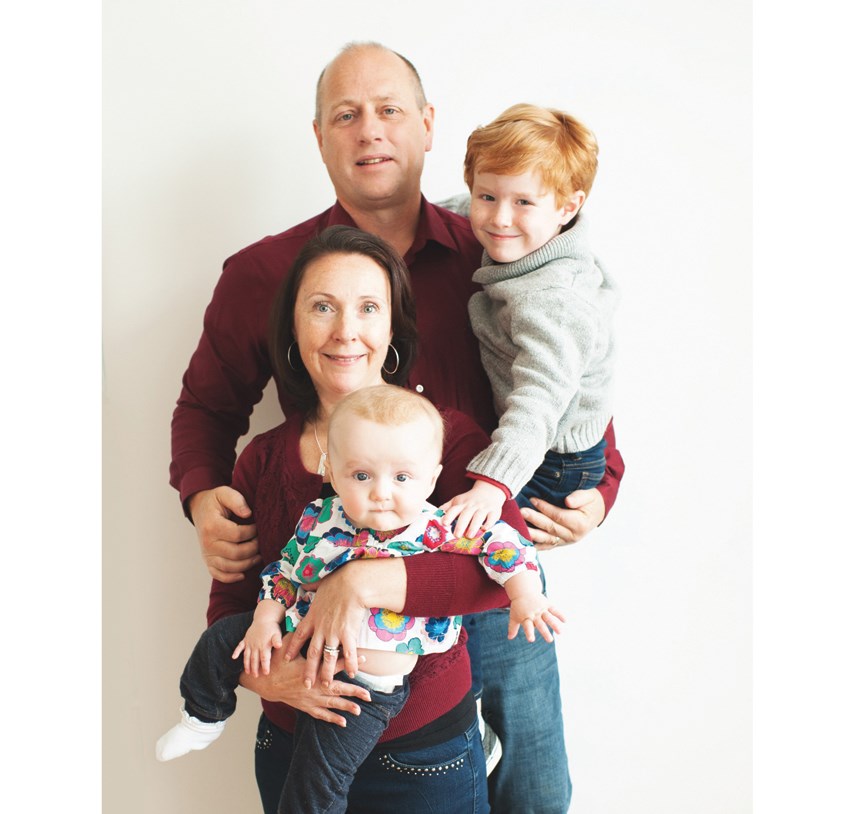She could barely utter a word, but in the end they learned it was only one word that mattered.
Following Christy Campbell’s stroke in 2005, the then 31-year-old developed a communication disorder called aphasia. It affected the speech centre of her brain, and while Campbell dealt with mobility issues and the numerous other health concerns stroke survivors are compelled to address, she was also left without the ability of speech. For the next two years, she was only able to get out one word: “Yes.”
Campbell and her husband, Sean Standing, had only been seeing each other for 18 months when her life as she knew it was turned upside down. Standing quickly learned that Campbell had a long road ahead of her. If he stuck around, surely his life would be turned upside down too.
Asked what kept these two young people together after being faced with what seemed like impossible odds, Standing says the only convincing he needed was a simple four-letter word.
“Love,” he says. “It really was. When I met Christy it was one of those love at first sight kind of things. She filled my heart and I just couldn’t see myself living without her.”
While careful to not take away from the mental, physical and emotional load that stroke survivors must endure, Standing is open about the challenges he faced when all of sudden he was thrust into the role of caregiver following his loved one’s stroke.
“It radically altered her life and mine as well,” says Standing. “You’re managing your own life and you’re managing someone else’s life.”
Overnight, Standing became his partner’s planner – organizing her various physiotherapy and occupational therapy sessions – her nurse, and her primary, non-professional caregiver. He helped bear the emotional burdens Campbell underwent. He cleaned the house and did chores and helped Campbell any way he could while still holding down his own job to support them.
It’s a set of circumstances he knows countless others are faced with across British Columbia.
“Given the value that caregivers give to their loved ones willingly, the stress level that goes along with a lot of it, I think there needs to be a lot more recognition of caregivers and support of their mental health,” says Standing.
The Stroke Recovery Association of British Columbia, which is celebrating its 40th anniversary this year, provides a network of community stroke recovery programs across the province.
In a press release, Brent Page, executive director for SRABC, states that “research, advocacy and meaningful support for caregivers needs renewed focus and must embrace technological advances so that caregivers in rural and remote communities can also receive the support they need.”
Page suggests that more training should be offered to non-professional caregivers. He also recommends more studies are needed on the impacts of caregivers so policy makers can inform decisions around resources that’ll help them and so society at large can properly recognize them, according to the release.
“The caregiver role is often overlooked within the health-care system,” says Standing. “Christy for two year really didn’t have speech. It wasn’t until really in her third and fourth year that her speech started to come back. That’s long after the health-care system has let go – the role of the caregiver is to be the coach, to be the planner, and the assistant.”
When Campbell had her stroke almost 15 years ago, the resources for caregivers were different, explains Standing. A lot of the resources at the time were geared towards women being the primary caregivers – and it was usually older women taking care of older men.
“A lot of the resources that were available, were available during the day. I was working, so I didn’t have access to them. And then, the ones that I did get access to, it’s a very different life – if you’re 36 and you’re talking to someone who’s 65, that’s a big age gap.”
While recognizing work still needs to be done, Standing says that because of the work of the SRABC and other stroke recovery organizations, “the landscape has changed.” There’s now more resources for caregivers available at night, instead of solely in the middle of the work day, in addition to resources now available on the weekend and online.
Thanks to intensive therapy in addition to the strong support from Standing, Campbell persevered over the years, regaining her mobility and ability to communicate.
Since then, Campbell and Standing have become strong advocates for other stroke survivors and those who experience aphasia. In 2016, Campbell received a Courage to Come Back Award, which honoured her journey from stroke survivor to advocate.
“There’s lots of people that once they’ve had a stroke and have aphasia they aren’t able to regain much of their language,” says Standing. “We’ve worked pretty diligently with the hospitals in the Lower Mainland, with University of British Columbia, with the Stroke Recover Association of BC, with March of Dimes Canada to create resources for people with aphasia, to raise awareness around stroke and stroke recovery.”
For its 40th anniversary, SRABC is hosting a fundraising gala on Oct. 9 in Vancouver. The theme of the gala focuses on how people have used art to recover after a stroke. Visit strokerecoverybc.ca/art-after-stroke-2019 for tickets or more information.
As for Standing and Campbell, in addition to their stroke recovery advocacy, the pair has also now been married since 2010. While love is what helped them manage through Campbell’s stroke recovery as a couple, Standing credits Campbell’s can-do demeanor – and the one word she was able to utter for a number of years – for her resiliency in the wake of a monumental health challenge.
“She could say, ‘Yes,’ which speaks to her attitude,” he says.



